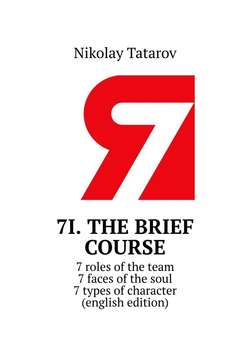Читать книгу 7I. The brief course. 7 roles of the team. 7 faces of the soul. 7 types of character (english edition) - Николай Татаров - Страница 7
§1. FAMILY
CHARACTER FORMATION AND QUALITY OF THE SOUL
ОглавлениеBut getting back to the team…
To become a part of the team, a person needs to enter the team for some role. The only question is, for which particular role? Usually, in the team, there are occupied roles, and there are also unoccupied (vacant) roles. And then it turns out that anyhow a role for a person does not fit. Not all roles are equally acceptable for him. There are roles that he likes, and there are those that he does not like. What does it depend on? – From the character formation.
People are different. Each person has his own character composition, his own set of spiritual qualities, his own peculiarities of character. Qualities of the soul, traits of character, peculiarities of character, the tendency of nature – all this same, is role preferences of the person. Each person attempts to occupy the most preferred role for them in the team or at least one of the acceptable roles to him. Another thing is that not always such roles are offered to him. It happens that those roles are already occupied by someone.
The most preferred role is the dominant of the character. It defines the type of character, therefore it is called as well the essence of the character, the essence of the soul or simply the essence of a person. Questions: “What is his character? What is his type of character? What is the essence of his soul? What is the essence of this person” are always a question about what role dominates in the character of this person.
The feelings connected with the role dominating in character generate the leading traits of character of the person. For example, the feelings connected with a role of the Idol – pride, joy and complacency; – generate the corresponding qualities of the soul: arrogance (superiority), idleness (hospitality) and laziness (self-complacency, self-content). If the role of an Idol dominates in character of the person, then those traits of character will be the leading traits of his character.
Of course, the character of a person is not reduced to the dominant of the character (to the most preferable role). Every person is familiar with all the roles, in every person, there is his 7I. However, in the characters of different people there is a different ratio of those seven I. Some I in the character are in a surplus, and others I is lacking. For example, there are people in the character of whose there is a surplus of selfishness and cunning, and heroism and self-sacrificingness is lacking. And others are different: arrogance, idolatry is excessive, and hardness and perseverance is lacking.
To find out the character formation of the person it is necessary:
– At first, it is necessary to reveal the prevailing roles, it is necessary to find out what qualities of roles (what “I’s) in the character are in a surplus and what – in a shortcoming;
– Then it is necessary to distribute the roles according to the degree of their preference for this person. The most preferred role is the dominant of the character (the basic “I” of a person), the less preferred role is his second “I”, an even less preferred role is his third “I”, etc.
As a result, it is possible to make a mental portrait of the person, i.e. a portrait of his soul.
7 heads of Rugevit
In the picture shows the ancient Slavic god Rugevit. 7 heads of Rugevit under the hat – this is the 7 of his I. The upper head of Rugevit is his basic I (the dominant of his character). Two heads below are two other roles that prevail in his character (the other two “I’s of Rugevit).
It should be noted that not only the Western Slavs worshiped to a seven-faced idol. The Nenets also worshiped their seven-faced idol Vesako on the island of Vaigach.
